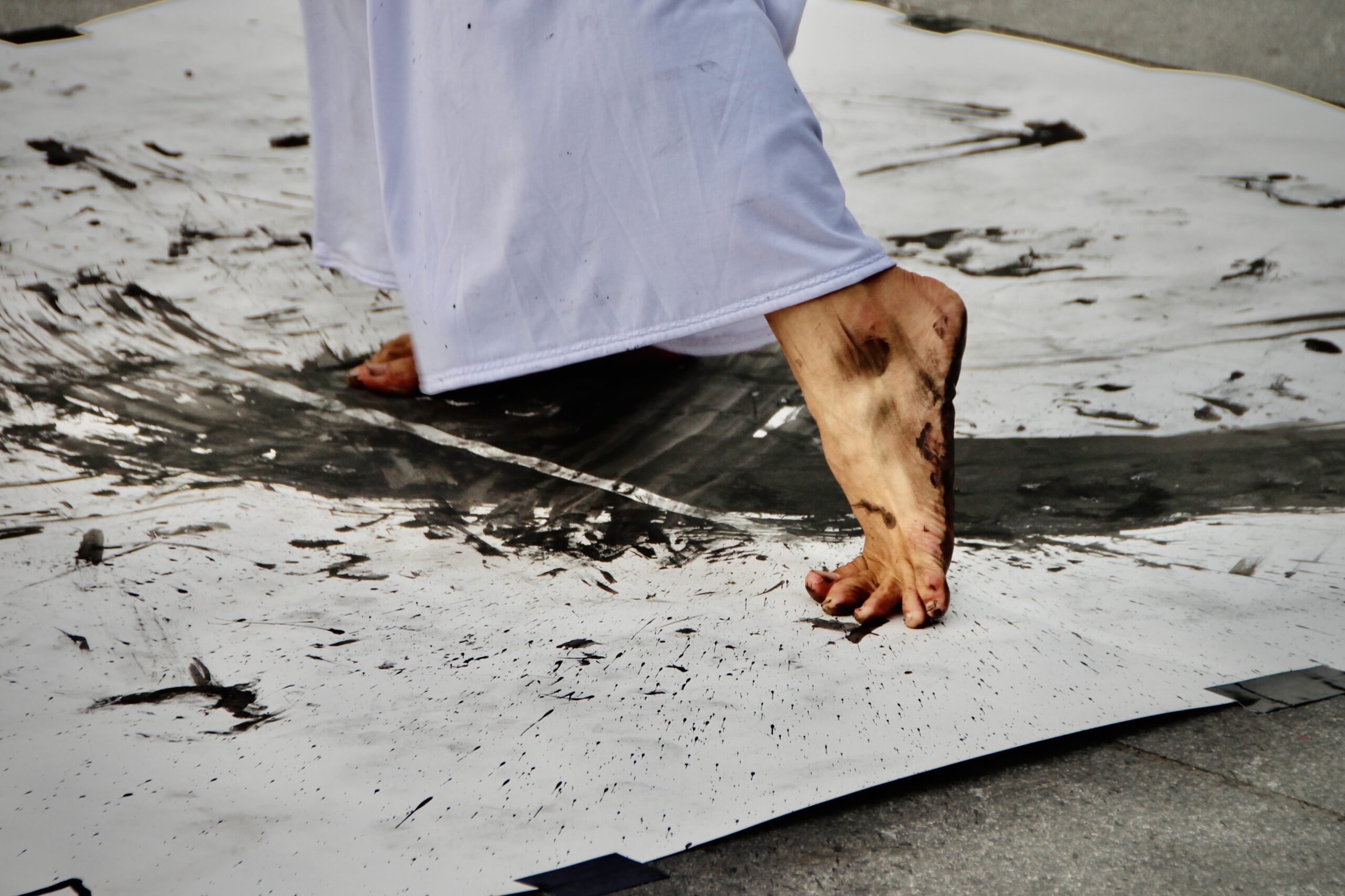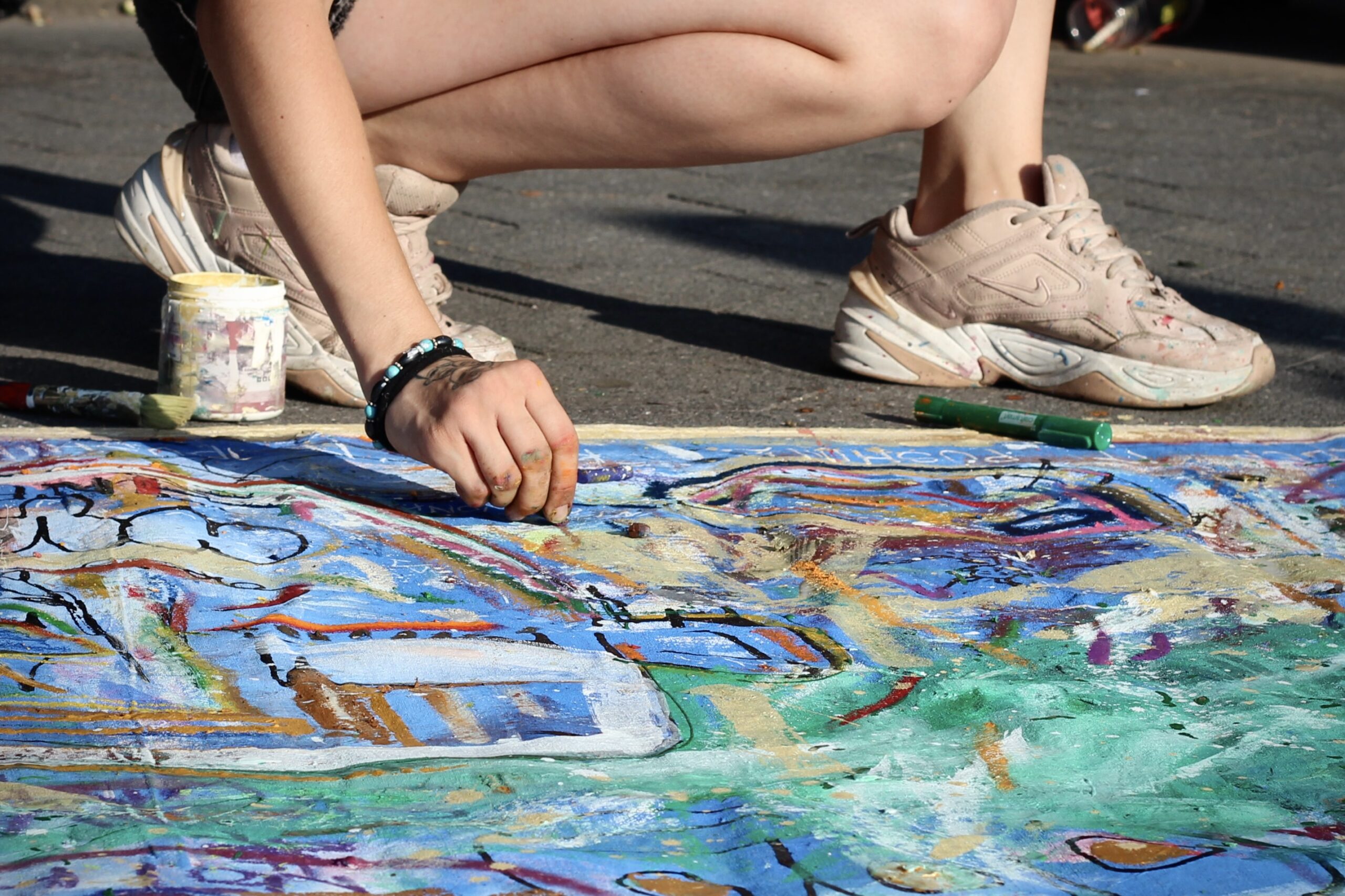On Wednesday evenings at 6 p.m., J. Eric Cook, 56, begins ringing his bell in Washington Square Park. It’s his way of reminding the crowd about what he calls the “ongoing, regular harassment of artists” by the parks department and the police. Along with Kanami Kusaijama, 26, an interpretative dancer, and other artists, he circles the iconic central fountain for six minutes. “We are living art!” they chant. “You are living art!”
Over recent weeks, these artists have transformed into organizers, conducting protests and meetings with City Council and park officials. They are trying to get the rules that govern the sale of art and sound amplification in the park overhauled, or at least enforced differently. Artists say they are at constant risk of harassment, fines or arrest by police, even as the city’s rules appear to prohibit many of their activities.
The long-standing conflict between artists and the police has, over recent weeks, manifested as organized resistance in this park. The movement stems from rules that artists have long claimed violate their First Amendment rights.
On July 20, Kusaijama was ticketed by police who said her small bluetooth speaker violated a rule prohibiting amplification devices in the park. Two months later, the ticket was dismissed, without so much as a hearing. “What was the point?” she asks.
Washington Square has a rich history of hosting great artists, including Jean-Michel Basquiat and William S. Burroughs. Many residents say the artists are an indispensable part of the park. “Some of my favorite memories are in the summers, going around the center of the park, finding these pockets of musicians — a beautiful medley of sound without overpowering each other, very respectful,” said Talisman Brolin, a photographer and lifelong resident of the West Village.
The city has even embraced artists on occasion. Post-lockdown, the mayor’s office featured Kusaijama in a 2021 ad campaign, with a photo of her captioned, “There’s No Stopping Art” splashed across bus stops.
But in recent months, artists have been ticketed, and sometimes arrested, under 2010 rules that control the sale of “expressive matter.”
Expressive matter is artistic material that includes paintings, prints, photography and sculpture. The term largely excludes crafts that have a functional purpose, such as clothing and jewelry. Thanks to the First Amendment, it can be sold without a permit. But the park rules, and accompanying maps, designate where it may be sold.
Washington Square is absent from these maps. And park rules prohibit selling expressive matter within 50 feet of a monument, such as the park fountain, within 12 feet of a public pathway, and within five feet of any street, park furniture, or tree. That leaves no room for legitimate sales within the 9.75-acre park.
“If the cops did decide to enforce the rules, there wouldn’t be a single vendor left in the park,” says Robert Lederman, 73. He says he has been a street-art vendor since he was 11, including in Washington Square, and has been arrested dozens of times. He has sued the city repeatedly, managing in 2001 to secure a decision from a U.S. District Court that enabled artists to sell art in any city park without a permit.
In 2010, the city enacted the rules that govern parks today. According to Lederman, those rules were a vindictive attempt to circumvent the court rulings that artists had won. In 2012, a federal court thought so too, observing that the rules were in large part “a response to Plaintiff Robert Lederman’s prior course of litigation.”
Kelsey Jean-Baptiste, press officer for the parks department, said that there hasn’t been any new crackdown in enforcement or change in policy. “Officers’ first course of action is to educate park-goers to our rules,” she said.
The Washington Square Park Conservancy, an organization that works to keep the park clean and safe, declined to comment. In a statement in August, spokesperson Grace Harman stated, “We are supportive of buskers and artists who practice within NYC Parks regulations.”

Kanami Kusaijama performs in Washington Square Park. (Credit: Mukta Joshi)
But artists are confused by the way the rules are enforced. “The cops just told me that I wasn’t allowed to place stuff on the ground, that I needed a table, and not to play loud music. So I got a clothing rack, and the cops have never really bothered me,” said Andy Mateo, who sometimes sells clothing in the park.
Other times, policemen stood by while people sold all kinds of things — not just art — around the fountain. “I don’t know why they aren’t enforcing the rules today,” said Cook, who began selling his art in the park in 2016. “On some days, they crack down, and on other days they don’t. It’s totally arbitrary.”
The enforcement has been especially harsh of late, artists say. “The summer of 2021 was the worst for performers and musicians,” said Kusaijama, “but this year it’s been harsher for art vendors.” According to the New York Post, police issued 14 vending tickets and made 12 arrests in the park between July 15 and Aug. 3, an increase from the same period in 2022, when seven tickets had been handed out, and 10 arrests made. The NYPD did not respond to requests for similar data for 2023. According to data provided by the parks department, however, the Parks Enforcement Patrol issued two tickets to expressive matter vendors this year, compared to zero in 2022 and 2021, and one in 2020.
The police have been cracking down on other vendors as well. On Aug. 13, police pinned a woman to the ground following an altercation over an umbrella set up over her jewelry stall.
Police are “not interested” in finding a solution, said Rich Caccappolo, member of the Parks Committee of Community Board 2, in whose jurisdiction Washington Square falls, adding that police declined an invitation to attend a recent meeting. The NYPD did not respond to multiple requests for a comment.

Elizabeth Yurovskaya, 22, who goes by the name ZilFutura, paints in Washington Square Park. Yurovskaya says she has been asked by police to pack up her art before, a request she complied with. “I didn’t want trouble.” (Credit: Mukta Joshi)
But Harman said that residents haven’t been complaining about the artists. She added that most concerns the Conservancy receives are about skateboarding, which is prohibited, or drugs and violent crime.
“I’m not pro police enforcement, but I’m not against it, as long as there is consistency and an understanding of what can and can’t be done by artists to present and perform their art. Because it is majestic,” said Darren Glick, 53, a real-estate professional who has lived in an apartment overlooking the park for 31 years. The police “are restricting the soul of the entire Village. There’s a very serious drug problem in the park, but they’re not going after that.”
Lederman wants something more fundamental to be done: “If we want to change the situation, we have to change the rules.”
The performers have prepared a proposal to limit amplified musical instruments and portable speakers below 80 decibels, to be played only between 9 a.m. and 10 p.m. Eighty decibels is what the WHO lists as within the limit for safe listening for up to 40 hours per week — quieter than a shouted conversation, or a hair dryer.
The artists have also proposed that space limitations be eased and that restriction on umbrellas set up over stalls be removed.
The movement carries on. In the meantime, artists have taken to calling their movement the “Butterfly Revolution.”
“Butterflies are beautiful. They’re peaceful, they’re harmless, but in a cluster, they can be annoying. We’re going to be annoying until they listen to us,” Kusaijama says.
About the author(s)
Mukta Joshi is an India-qualified lawyer and a fellow at the Toni Stabile Center for Investigative Journalism at Columbia Journalism School.



